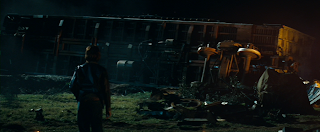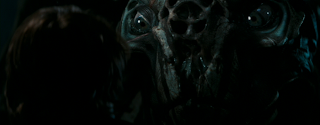The word 'superate' means to rise above, to surpass, to overcome, to surmount and to get over. Super 8 is a love story and a monster movie but fundamentally it is about a boy coming to terms with the death of his mother.
A hole has opened up in Joe's and his father's life and they are battling not to be sucked into it. Their fight against grief, which they keep hidden as deep down as where they are wounded, comes to the surface through the metaphor of war.
Joe is working on a film with friends. In one scene we see him playing a soldier. Later his Dad disguises himself in army uniform so that he can find out what they know about the alien rampaging across their town. The carnage caused by their unwelcome visitor - buildings trashed, cars overturned, tanks misfiring - is an image of an all-consuming grief so large that it begets a war zone.
Fighting - The Internal made External
At the end of the film, when Joe begins to come to terms with his mother's passing, the alien leaves (alien emotional presences for a young boy - grief, love etc. - form the backbone of the film) and takes the soldiers' guns with it. Both battles were joined and dissolved as one.
This battle that Joe is fighting within himself stands in the way of, and is eventually won with the help of, his friendship with Alice. This is beautifully visualised with the same war metaphor when, to let her climb into his bedroom, he has to remove a row of toy soldiers from his windowsill (and literally let his guard down).
Alice brings him both pleasure and pain. There is ample reason to believe that she reminds him of his mother, whether through her kindness, her aura, or simply by virtue of the emotions she stirs up within him. It is telling that when his father forbids him to see her Joe describes her character as motherly: "she's kind...she's nice to me".
In his mind, symbolised by her role as a zombie in their film, she represents life and death, a reanimation of interred suffering and love.
(Above) Zombie Alice
Death and Life
(Below) "Relive the Memories" - Talking to Alice on the phone
Joe tells Alice how when his mother "really looked" at him "he knew that [he] was there...that [he] existed". When Joe is applying her makeup (with which brings out life and death) for the purpose of the film Alice mentions the accident that killed his mother. Joe asks her to close her eyes and tears begin to well up in his. He cannot stand her to "really look" at him in the same way and see inside. Love falls into grief and here Alice comes to stir it before it is ready to be awaken.
Alice, in the absence of his father's (a bereaved man busy dealing with the aftermath of the extraterrestrial breakout) comfort, protects Joe and heals him. We see this most clearly via the surrogate of Joe's model train.
Cradling Joe
Train carriages come to stand for Joe himself. For the purpose of the film, Charles wants to blow up one of the model trains Joe has made and painstakingly decorated. Joe agrees but Alice encourages him to stand up to Charles. Alice, by intervening, is guarding Joe's heart and encouraging him to see that things can still have meaning.
He shows her one of his lovingly painted carriages - thanks to her he still values himself enough to share his soul, shyly proudly, with her.
The alien is released by a train crash that occurs at a moment of emotional crisis. Joe is watching Alice film a scene in which she declares her love for her character-husband. Joe places herself in his shoes, bewitched by this wonderful girl, and the ungainly euphoria hits him, literally, like a train. In a sense, then, Alice creates upheaval and kick-starts the slow assimilation and dissolution of undigested grief. The alien emerges from the wreckage.
As Joe watches, the creature bursts open an upturned carriage as if it is breaking out of him. The alien is grief, it is chaos, it is a catalyst, magnet and vector for sorrow.
The alien breaks free from the train
The alien is a restless ghost. It is hurt and angry, held hostage by the army and prevented from going home. She too is kept from going 'home' by the knowledge that Joe is not OK. It is a corpse that builds a subterranean realm beneath the cemetery where Joe's mother lays. Buried bodies, buried feelings.
(Above) The image of the alien projected on Joe's face
The alien is Joe. In the denouement Joe looks into the alien's eyes, "really looks", and tells it "bad things happen but you can still live". Joe stands outside of himself and reassures his trembling heart. The alien's cold horrific eyes part to reveal its eyes of no little warmth and light beneath. They have helped each other see.

It leaves. It takes parts of the town with which to create its spaceship; Joe's mother took a part of him with her. The last piece of the "model" the alien crafts (it is a model-maker just like Joe) is a locket Joe carries with him. Inside is a picture of him and his Mum when he was a baby. Joe hangs on to it as it is pulled upwards...and then he lets go.
Letting Go
Joe and Alice look up into the night sky, into heaven, and smile as it departs. Their fingers intertwine. Joe holds her hand softly where he would once grip his mother's image fiercely, jealously, desperately. Godsends, Alice and the creature both.
This wasn't just an alien or a monster but so much more - it was everything monstrous and everything alien.
















